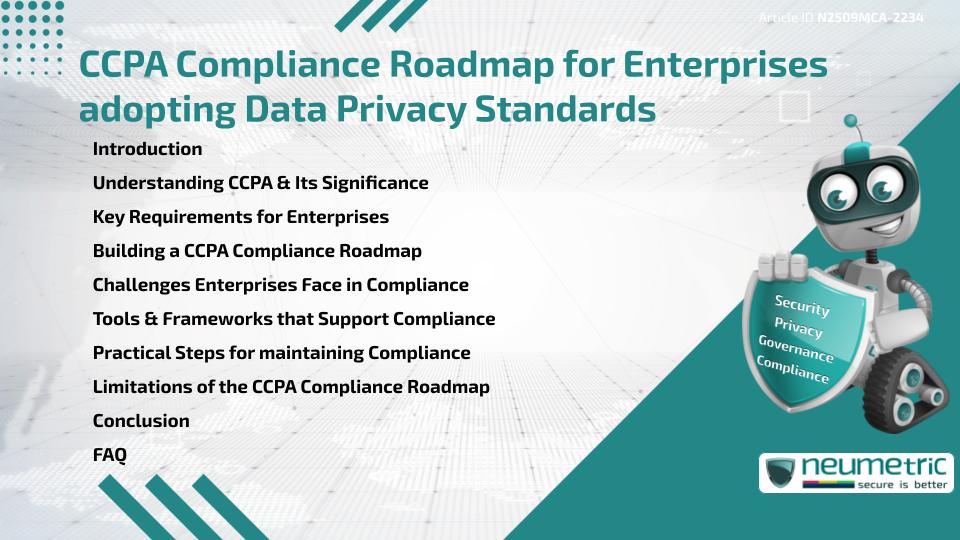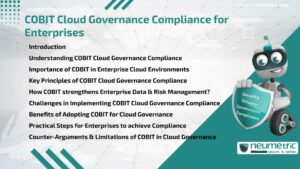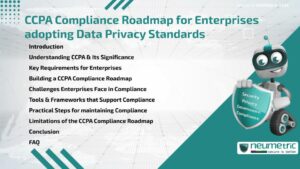Table of Contents
ToggleIntroduction
The California Consumer Privacy Act [CCPA] introduced a new era of Consumer Data Protection in the United States. For Organisations, complying with these Standards will require a structured approach that covers legal obligations & also Consumer expectations. A CCPA Compliance Roadmap provides Organisations with a step-by-step plan to ensure adherence, reduce Risks & demonstrate accountability.
This article explores the significance of CCPA, outlines essential requirements & guides Enterprises through the key stages of building a reliable CCPA Compliance Roadmap. It also examines challenges, tools & limitations, helping leaders better understand how compliance aligns with broader Data Privacy standards.
Understanding CCPA & Its Significance
The CCPA, effective since January 2020, grants California Residents specific rights over their Personal Data. These rights include the ability to Access, Delete & Restrict the sale of Personal Information. Enterprises doing business in California or handling data of its residents must comply with these requirements.
The law is often compared with the General Data Protection Regulation [GDPR] in Europe, but CCPA is unique in its focus on consumer control rather than consent. Its introduction has pushed many businesses to adopt Data Privacy standards across their operations, not just in California.
For more details, see California’s Official CCPA Page.
Key Requirements for Enterprises
Enterprises must understand & fulfill several obligations under CCPA. Some key requirements include:
- Providing clear Privacy notices.
- Enabling Consumer Rights requests such as Data Access & Deletion.
- Revealing Data sharing practices, particularly in relation to the sale of information.
- Implementing Security Measures to protect Personal Data.
- Training staff on Privacy responsibilities.
Building a CCPA Compliance Roadmap
A CCPA Compliance Roadmap helps Enterprises approach compliance systematically. Its stages typically include:
- Assessment – Identify what Consumer Data is collected, stored & shared.
- Gap Audit – Compare current practices against CCPA requirements.
- Policy Development – Draft or update Privacy Policies to meet legal Standards.
- Process Implementation – Establish workflows for data access & deletion requests.
- Technology Integration – Use tools to automate consent management & request tracking.
- Monitoring & Review – Continuously update Policies as business practices evolve.
Like a travel map, this roadmap shows where the organisation stands, what routes it must take & how to avoid legal pitfalls.
Challenges Enterprises Face in Compliance
Adopting a CCPA Compliance Roadmap is not without obstacles. Common challenges include:
- Managing legacy systems with fragmented data.
- Handling large volumes of consumer requests.
- Aligning internal teams on Privacy priorities.
- Balancing Business Objectives with strict compliance standards.
These issues highlight the need for enterprise-wide collaboration & strong leadership commitment.
Tools & Frameworks that Support Compliance
Enterprises can rely on various frameworks & tools to support their CCPA Compliance Roadmap. These include:
- Privacy Information Management Systems [PIMS].
- Data Discovery & Mapping Software.
- Automated Consumer Rights Request Platforms.
- Internal Audit Frameworks like ISO 27701.
Each tool plays a role in making compliance more efficient & scalable.
For technical approaches, visit NIST Privacy Framework.
Practical Steps for maintaining Compliance
Compliance is not a one-time project but an ongoing responsibility. Enterprises can maintain their CCPA Compliance Roadmap by:
- Training Employees regularly on Privacy rights.
- Auditing Vendors & Partners for data handling practices.
- Updating Policies with each legal amendment.
- Engaging consumers through transparency reports.
This continuous cycle ensures Enterprises keep pace with evolving Privacy expectations.
Limitations of the CCPA Compliance Roadmap
While useful, a CCPA Compliance Roadmap has limitations. It cannot eliminate all Risks, nor can it account for every industry-specific challenge. Additionally, CCPA compliance does not automatically mean compliance with other global Privacy regulations. Enterprises must adapt their roadmap to broader Privacy frameworks to ensure complete coverage.
Conclusion
A CCPA Compliance Roadmap provides Enterprises with a structured path to align with CCPA requirements while embracing broader Data Privacy standards. By understanding the law, addressing challenges & using supportive tools, Enterprises can protect Consumer Rights & strengthen trust.
Takeaways
- CCPA gives California Residents strong control over Personal Data.
- A CCPA Compliance Roadmap helps Enterprises plan compliance systematically.
- Key steps include Assessment, Gap Audit, Policy Updates & Monitoring.
- Challenges like legacy systems & consumer requests require strong planning.
- Compliance is ongoing & requires regular training, audits & updates.
FAQ
What is a CCPA Compliance Roadmap?
It is a structured plan that guides Enterprises through the steps needed to meet CCPA obligations.
Who needs to follow the CCPA Compliance Roadmap?
Any enterprise handling Personal Data of California residents, regardless of where it is based, must comply.
How is a CCPA Compliance Roadmap different from GDPR Compliance?
While GDPR focuses on consent, CCPA emphasizes Consumer Rights & control, requiring Enterprises to design processes differently.
What tools help Enterprises achieve compliance?
Tools like data discovery software, request automation platforms & Privacy frameworks support compliance efforts
Can Small Businesses use a CCPA Compliance Roadmap?
Yes, smaller Organisations can adopt simplified versions of the roadmap to meet their Compliance Requirements.
What happens if an enterprise ignores compliance?
Ignoring compliance can lead to fines, legal action & loss of consumer trust.
Does compliance ensure global Privacy protection?
No, compliance with CCPA does not equal compliance with other laws like GDPR, though it provides a strong foundation.
References
Need help for Security, Privacy, Governance & VAPT?
Neumetric provides organisations the necessary help to achieve their Cybersecurity, Compliance, Governance, Privacy, Certifications & Pentesting needs.
Organisations & Businesses, specifically those which provide SaaS & AI Solutions in the Fintech, BFSI & other regulated sectors, usually need a Cybersecurity Partner for meeting & maintaining the ongoing Security & Privacy needs & requirements of their Enterprise Clients & Privacy conscious Customers.
SOC 2, ISO 27001, ISO 42001, NIST, HIPAA, HECVAT, EU GDPR are some of the Frameworks that are served by Fusion – a SaaS, multimodular, multitenant, centralised, automated, Cybersecurity & Compliance Management system.
Neumetric also provides Expert Services for technical security which covers VAPT for Web Applications, APIs, iOS & Android Mobile Apps, Security Testing for AWS & other Cloud Environments & Cloud Infrastructure & other similar scopes.
Reach out to us by Email or filling out the Contact Form…





